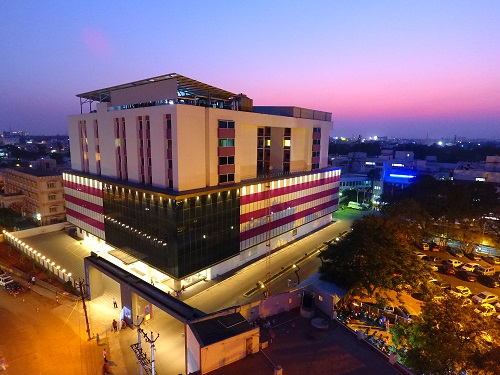With rising cases of chronic liver disease across India, experts at Sri Ramakrishna Hospital urge early intervention and clarify that not all patients require a transplant. The hospital also reassures the public about the safety of modern liver transplants, including living donor procedures, offering hope and clarity to affected families.
 |
Sri Ramakrishna Hospital, Coimbatore
Chronic Liver Disease (CLD) is often a silent and progressive condition that affects millions of people across the country. What begins as mild liver damage can slowly evolve into cirrhosis or even liver failure if not identified and managed early. At Sri Ramakrishna Hospital, Coimbatore, one of Tamil Nadu’s leading centres for liver care and transplant, liver specialists are calling attention to the importance of early treatment, misconceptions about transplantation, and ensuring donor safety in living liver donations.
Don’t Wait for the Symptoms to Worsen: When to Start Treatment for Chronic Liver Disease
According to Hepatologists in Coimbatore, the biggest mistake many patients make is waiting for symptoms to become severe before seeking help. Chronic liver disease doesnt often show signs in the early stages. Many patients come to us only after they develop jaundice, fluid buildup in the abdomen, or confusion-all signs of advanced disease.
CLD is a slow-burning condition caused by long-term damage to the liver from reasons such as alcohol use, viral hepatitis (B or C), non-alcoholic fatty liver disease (NAFLD), autoimmune disorders, or certain medications.
The key to managing CLD is to start treatment as soon as it’s diagnosed-even if symptoms are mild or absent. Early-stage treatment involves addressing the cause, monitoring liver function, making lifestyle changes, and sometimes using medications to slow or halt progression.
Does Every Chronic Liver Disease Patient Need a Liver Transplant
A question many people ask liver doctors is, “Does every patient really need a liver transplant” The answer is not always.
Only a small percentage of patients with CLD actually require a transplant. Many can lead long, healthy lives with medical management, regular follow-ups, and timely interventions.
A transplant is usually considered only when the liver can no longer perform its essential functions-processing toxins, producing proteins, or regulating blood clotting. Signs of liver failure include repeated fluid accumulation (ascites), gastrointestinal bleeding, confusion (hepatic encephalopathy), or dangerously elevated bilirubin levels.
The decision for transplant is never rushed. Our Liver Transplant team at SRH use international scoring systems like MELD (Model for End-stage Liver Disease) to assess how sick the liver is, and whether the patient will benefit from a transplant in the short and long term.
Liver Transplantation – How Safe Is It Today
Liver transplantation has come a long way in terms of safety and success rates. At Sri Ramakrishna Hospital, the liver transplant team follows global standards and a highly streamlined approach to maximise success and minimise risks.
With better surgical techniques, critical care, and post-operative support, liver transplants today are safer than ever before. At Sri Ramakrishna Hospital, the success rates match global benchmarks, and the patients receive round-the-clock monitoring by a multidisciplinary team.
Transplant surgeries typically last 8 to 12 hours and are followed by intensive care monitoring for the first few days. Most patients are discharged within 2 weeks and go on to lead a normal, active life with regular follow-up and immunosuppressive medications.
Living Donor Liver Transplantation (LDLT): What About Donor Safety
Due to the shortage of cadaver (deceased donor) livers, Living Donor Liver Transplantation (LDLT) has become a vital option in India. In LDLT, a healthy person-usually a close relative-donates a portion of their liver, which then regenerates in both the donor and the recipient within weeks.
While many families express concern about the donor’s safety, Sri Ramakrishna Hospital ensures that donor care is the top priority.
A stringent evaluation is conducted before accepting a donor. Advanced imaging, cardiac testing, and psychological assessments are performed to ensure complete safety by the Liver Transplant experts in Coimbatore.
The donor undergoes surgery to remove about 30-60% of their liver, depending on the recipient’s needs. The liver begins to regenerate almost immediately, and most donors return to their routine within 4 to 6 weeks.
Chronic Liver Disease doesn’t have to be life threatening. Early detection, timely treatment, and the right medical team can change outcomes dramatically. The liver is one of the only organs in the human body that can regrow or regenerate. The earlier the damage is addressed, the higher the chance of recovery.
Sri Ramakrishna Hospital in Coimbatore is a leading centre in South India for treating liver diseases and performing liver transplants. With a multidisciplinary team of experts, cutting-edge surgical facilities, and a deeply compassionate approach to care, the hospital is committed to guiding patients and their families through every stage of their liver health journey. Whether it’s early intervention for chronic liver disease or advanced transplant care, Sri Ramakrishna Hospital ensures that every patient receives personalised, safe, and life-restoring treatment.
Sri Ramakrishna Hospital in Coimbatore provides care for Liver transplant patients at highest quality matching global standards, which is affordable to the people of this region who come and experience the safe. affordable and empathetic liver case by our highly trained transplant team at Sri Ramakrishna Hospital.
![]()











